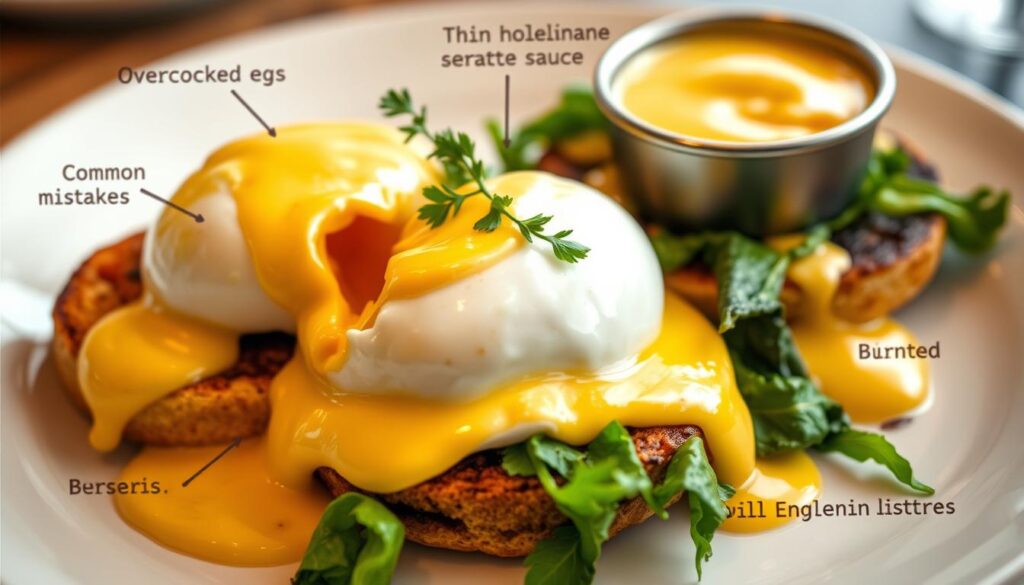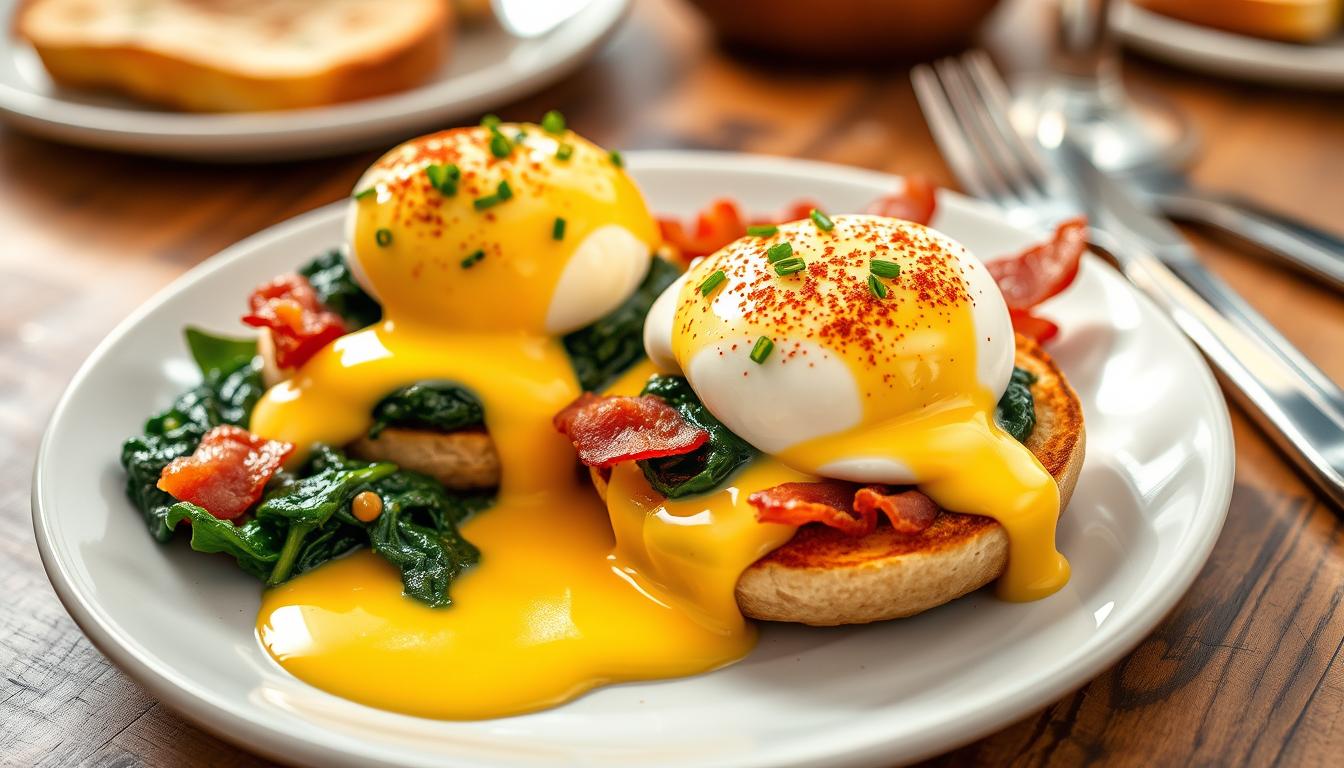Eggs Benedict is a brunch dish loved by many. It combines poached eggs, Canadian bacon, and hollandaise sauce on a toasted English muffin. It’s perfect for both seasoned cooks and beginners. This guide will show you how to make a delicious Eggs Benedict at home.
Key Takeaways
- Eggs Benedict is a classic brunch dish featuring poached eggs, Canadian bacon, and hollandaise sauce on an English muffin.
- Mastering the art of poaching eggs and creating a silky hollandaise sauce is the key to perfecting this dish at home.
- With the right techniques and tools, you can easily recreate this restaurant-quality brunch favorite in your own kitchen.
- Eggs Benedict is a versatile dish that can be customized with various ingredient substitutions and creative twists.
- Proper timing and coordination are essential when assembling the different components of Eggs Benedict for the best results.
The History Behind Eggs Benedict: From Manhattan to Global Fame
The story of Eggs Benedict starts at Delmonico’s Restaurant in New York City. This famous place was founded in 1837. It’s known as the birthplace of this beloved brunch dish.
The Delmonico’s Restaurant Origin Story
Legend says Mrs. LeGrand Benedict asked for a special breakfast at Delmonico’s in the late 19th century. The chefs made a dish with poached eggs, Canadian bacon, and Hollandaise sauce. They served it on a toasted English muffin.
Evolution of the Classic Dish
Since then, Eggs Benedict has grown from its start at Delmonico’s to a global brunch favorite. Chefs have tried many variations, but the core remains the same. Poached eggs, Canadian bacon, and Hollandaise sauce are still key.
Cultural Impact on Brunch Culture
Eggs Benedict has changed how we enjoy brunch. Its popularity has made brunch more popular. Now, people look forward to trying this rich and satisfying dish. It’s a must-have on menus everywhere, loved by many.
“Eggs Benedict is a culinary masterpiece that has stood the test of time, captivating the hearts and palates of brunch enthusiasts around the globe.”
Essential Ingredients for Traditional Eggs Benedict
Making the perfect Eggs Benedict needs the right ingredients. At its core, this classic dish combines key elements for a balanced taste.
First, you’ll need fresh eggs for poaching. The Canadian bacon adds a savory touch. And don’t forget the English muffins for a light base.
The hollandaise sauce is the star. It’s made with butter, egg yolks, lemon juice, and spices. This sauce brings everything together.
Other ingredients enhance the dish. A squeeze of lemon juice brightens the taste. A sprinkle of salt and pepper adds flavor. And a bit of butter greases the pan.
With these Eggs Benedict ingredients, you can make this iconic dish at home.
| Ingredient | Quantity | Purpose |
|---|---|---|
| Fresh eggs | 4-6 eggs | Poached to perfection |
| Canadian bacon | 4-6 slices | Savory foundation |
| English muffins | 2-3 muffins | Toasted base |
| Hollandaise sauce | 1 cup | Creamy, tangy topping |
| Lemon juice | 2 tablespoons | Brightens the flavors |
| Salt and pepper | To taste | Seasoning |
| Butter | 2-3 tablespoons | Greases the muffins and pan |
“The key to a perfect Eggs Benedict is using the freshest, highest-quality ingredients you can find.”
Kitchen Tools and Equipment You’ll Need
Making perfect Eggs Benedict needs the right tools and equipment. You’ll need essential cookware and special tools for poaching and making sauce. Let’s explore the must-have items for a culinary masterpiece.
Essential Cookware
A reliable set of cookware is key for Eggs Benedict. You’ll need a heavy-bottomed saucepan or double boiler for the creamy Hollandaise sauce. A whisk is crucial for mixing egg yolks, butter, and seasonings.
Also, a nonstick egg poacher or a deep saucepan with a poaching insert is vital. It helps you get perfectly poached eggs every time.
Specialized Tools for Perfect Poaching
Poaching eggs is a key step in Eggs Benedict. Get a dedicated egg poacher with individual cups or a multi-cup insert. These tools keep the eggs in shape while poaching.
Or, use a slotted spoon to gently place eggs in simmering water. This method is more hands-on.
Sauce-Making Equipment
The Hollandaise sauce is the dish’s highlight. To make it, you need a double boiler or a heatproof bowl over simmering water. This method heats the sauce gently, preventing it from scrambling.
A sturdy whisk is key for whisking the sauce to the right consistency.
With the right Eggs Benedict tools, you’re ready to make a brunch masterpiece. It will impress your guests and satisfy your craving for this classic dish.
Mastering the Perfect Hollandaise Sauce
Making a silky, creamy homemade hollandaise sauce is key to a tasty Eggs Benedict. This classic emulsion technique might seem hard, but with the right tips and patience, you’ll soon make restaurant-quality sauce.
Understanding the Emulsion Process
The secret to great hollandaise sauce is a stable emulsion. This means mixing egg yolks and melted butter smoothly. Hollandaise tips say to slowly add the butter while whisking to avoid breaking the emulsion.
- Use fresh, high-quality egg yolks for a rich texture.
- Melt the butter gently over low heat to keep the flavor.
- Add the butter slowly, whisking all the time to mix it well.
Mastering Temperature Control
Temperature control is key when making hollandaise sauce. The egg yolks need to be warmed just enough to thicken the sauce. The butter should be warm but not too hot, as extreme temperatures can ruin the emulsion.
| Hollandaise Sauce Troubleshooting | Solution |
|---|---|
| Sauce is too thin or watery | Whisk in an additional egg yolk to thicken the emulsion |
| Sauce is too thick or curdled | Slowly whisk in a teaspoon of warm water or lemon juice to thin it out |
| Sauce has separated or broken | Start over with a fresh egg yolk and slowly re-emulsify the broken sauce |
With patience and practice, you’ll get the hang of making perfect homemade hollandaise sauce every time.
Eggs Benedict Recipe: Step-by-Step Instructions
Making a delicious Eggs Benedict dish needs care and timing. From poaching eggs to putting everything together, we’ll guide you through it. This will help you become a pro at this classic brunch dish.
Poaching the Perfect Eggs
Poached eggs are key to Eggs Benedict. Getting them just right is important. Start by heating water gently, adding vinegar to keep the eggs round. Crack the eggs into the water and cook for 4-5 minutes. They should have set whites and runny yolks.
Assembling the Components
- Toast the English muffins until golden brown.
- Warm the Canadian bacon or ham slices in a skillet or the microwave.
- Prepare the hollandaise sauce according to your preferred recipe or method.
- Carefully transfer the poached eggs to the toasted English muffin halves.
- Top each muffin with a slice of warm Canadian bacon or ham.
- Drizzle the hollandaise sauce generously over the eggs and bacon.
Timing and Coordination Tips
Eggs Benedict is all about timing. Start by poaching the eggs first, as they take the longest. While the eggs cook, toast the English muffins and warm the Canadian bacon. Then, make the hollandaise sauce and put the dish together just before serving. This ensures everything is perfect.
By following these steps, you’ll make a fantastic Eggs Benedict. This dish will impress your guests and make your taste buds happy.
Common Mistakes to Avoid When Making Eggs Benedict
Making perfect Eggs Benedict is a fun challenge, but even experts can hit roadblocks. Issues like overcooked eggs and broken hollandaise sauce can ruin your dish. But don’t worry, knowing how to avoid these Eggs Benedict troubleshooting problems can help you serve a flawless dish every time.
One big hollandaise problem is when the sauce separates or curdles. This often happens because of too much heat or not mixing the ingredients right. To avoid this, keep the sauce cool and mix it gently and carefully.
- Overcooked eggs: Eggs that are too hard can mess up the dish. To get a soft, runny yolk, watch the cooking time and water temperature closely.
- Soggy English muffins: Muffins that sit too long can become soggy. Toast them just before you put the dish together for a crisp base.
- Hollandaise sauce breakdown: A broken hollandaise sauce is another common issue. Keep the heat low and whisk well to keep it smooth.
- Improper assembly: Rushing the layering can make the dish look messy. Take your time to build each part carefully for a beautiful Eggs Benedict.
By following these Eggs Benedict troubleshooting tips, you can avoid common cooking errors and hollandaise problems. With practice and attention to detail, you’ll be able to make a perfect Eggs Benedict that will wow your guests and satisfy your taste buds.

Creative Variations and Modern Twists
The classic Eggs Benedict is loved by many, but there’s a whole world of new twists. These include vegetarian options, regional takes, and healthier choices. Each variation keeps the dish’s core but adds fresh flavors and ingredients.
Vegetarian Options
For those who want to skip the meat, there are tasty vegetarian alternatives. You can use grilled portobello mushrooms or roasted red peppers instead of Canadian bacon. Smoked tofu or tempeh are also great options. The goal is to find something that pairs well with the creamy hollandaise sauce.
Regional Adaptations
Eggs Benedict has traveled the world, inspiring local twists. In California, it might have an avocado hollandaise sauce. The Pacific Northwest adds smoked salmon or crab cakes. In the South, a biscuit replaces the English muffin, making it a cozy dish.
Healthy Alternatives
For those watching their diet, there are lighter Eggs Benedict options. Try a lemon-dill yogurt sauce instead of hollandaise. Or, top whole-grain toast with sautéed greens and a poached egg. You can also use grilled chicken or avocado for a healthier twist.
Whether you’re vegetarian, on a diet, or just want to try something new, there’s a version of Eggs Benedict for you. These creative takes can make your brunch more exciting and introduce you to new flavors.
Make-Ahead Tips and Storage Guidelines
Don’t let a classic Eggs Benedict brunch turn into a last-minute rush. With some smart meal prep, you can start ahead and enjoy a stress-free event. Here are some tips and guidelines to help you master your meal prep brunch.
Prepping for Perfection
Planning is key for a great Eggs Benedict spread. Poach eggs early and keep them in an ice bath until you’re ready to reheat. For the hollandaise storage, make it a day or two before and chill it in the fridge. Just warm it up gently over a double boiler when it’s time to serve.
Mastering the Muffins
Toasting English muffins ahead of time is a smart move. Store them in an airtight container. Then, reheat them to make them crisp again. This reheating Eggs Benedict method keeps everything fresh and ready to serve.
Hosting a Crowd-Pleasing Brunch
For a big group, make extra poached eggs and hollandaise sauce. This way, you can quickly put together Eggs Benedict for your guests. A bit of prep work means you can enjoy the brunch with your family and friends.
| Component | Make-Ahead Tips | Storage Duration |
|---|---|---|
| Poached Eggs | Poach in advance, store in ice bath | Up to 3 days in the refrigerator |
| Hollandaise Sauce | Make sauce ahead of time, chill until ready to reheat | Up to 2 days in the refrigerator |
| English Muffins | Toast muffins in advance, store in airtight container | Up to 5 days at room temperature |
Mastering make-ahead techniques and storage tips lets you serve a delicious meal prep brunch easily. Your Eggs Benedict will always be a hit with your guests.

Pairing Suggestions and Serving Ideas
Make your Eggs Benedict even better with the right drinks and sides. Try pairing it with mimosas or Bloody Marys for a fun twist. Or, go for a fresh-squeezed orange juice or a warm rich, aromatic coffee for a non-alcoholic option.
Beverage Pairings
Mimosas mix sparkling wine with orange juice, creating a lively contrast to the hollandaise sauce. Add strawberries or raspberries for a seasonal twist. Or, a Bloody Mary with savory toppings brings a spicy kick to your brunch.
Side Dish Recommendations
Balance the Eggs Benedict with lighter sides. A green salad with a tangy dressing is refreshing. Or, try roasted potatoes or hash browns for a hearty touch. For extra indulgence, add creamy grits or buttery biscuits to your brunch.
